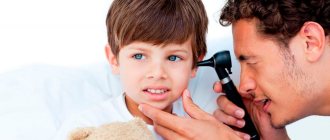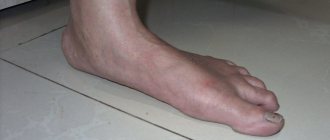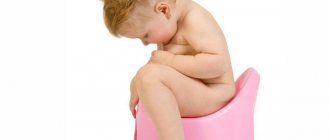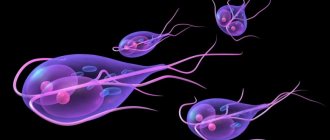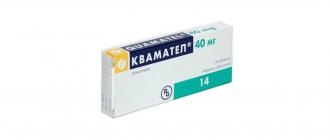You entered a store and saw a mother with a child running between the shelves and knocking over bags of groceries. What do you think at this moment - is this a hyperactive child or are his parents raising him poorly?
- How to figure out whether a child is behaving badly because he has “lost his hands” or he still needs to be shown to specialists.
- The doctor wrote "ADHD" on your child's chart. Is this a terrible diagnosis, do I need treatment or look for a good tutor?
- The child is uncontrollable, the mother-in-law says that the child’s father was also very active in childhood, but then “outgrew it.” Should I wait until he “outgrows it”, or is it better to take him to see a psychologist, as a friend advises?
- The child behaves badly, loses everything and forgets, punishments do not work. What to do?
It makes sense to install the “Where are my kids” application in order to exercise parental control over a hyperactive child without intruding too much into his boundaries.
You will find the answer to these and other questions in this article.
Content
- ADD and hyperactivity: what is it Types of hyperactivity
- Biological factors
- Hyperactivity
- ADHD or not?
ADHD: what is it?
ADHD stands for Attention Deficit Hyperactivity Disorder. It is characterized by increased motor activity and problems with attention and perseverance. More than half of the cases are accompanied by behavioral disorders and emotional instability (according to the Serbsky Medical Research Center for Psychiatry and Narcology).
ADHD is not just a diagnosis, but a whole group of disorders that are combined based on the presence of signs that do not correspond to age. Hyperactivity, attention deficit, impulsiveness, lack of sustainable motivation for activities that require volitional efforts - all this is ADHD.
Children with such disorders adapt poorly to society:
- “bad” behavior in kindergarten;
- conflicts with peers on playgrounds;
- problems with school performance;
- Difficulties with behavior in class (try to sit still, arms folded, for a whole 40 minutes, when there is so much interesting outside the window, and there is a cloud of thoughts in your head, and everything is not about studying);
- reluctance and inability to do homework independently, etc.
Types of hyperactivity
ADHD does not affect everyone the same way. When diagnosing, several types of syndrome are distinguished. Children may experience both excessive mobility and attention disorder, or there may be attention deficit without a hyperactive component. Or vice versa - the child is very impulsive, with difficult behavior that he cannot control, but he manages to perform attention tasks well. There are also mixed types. In any case, in order to accurately diagnose the disorder, studies (MRI, EEG, etc.) and medical supervision are necessary.
Scale of the problem
How many children like this are there in the world?
According to epidemiological studies in different countries, the incidence of this disorder ranges from 1-3% to 24-28%.
By age, this is approximately 5% among children under 18 years of age, 6% among school-age children, 3% among adolescents.
According to statistics, the leaders in the number of children with ADHD are the USA (4 - 20%) and Russia (7 - 16%). Then come China (1 – 13%) and Italy (3 – 10%).
*Data from “Hyperkinetic disorders” (ADHD) Koren E.V., Kupriyatnova T.A – Federal Medical Research Center for Psychiatry and Narcology named after V.P. Serbian Ministry of Health of Russia, Moscow, 2015.
The dispersion in statistics is due to the fact that different countries have different criteria and diagnostic methods.
Features of communication with such children
Raising a hyperactive child can be difficult. Even with strong love for their child, parents cannot always withstand all his tricks; they often break down and scream. And it happens that they stop raising him altogether, deciding “what he grows up, he grows up.”
It is not uncommon for parents to try to instill strict discipline in such a child, brutally suppressing all his antics and disobedience. The child is punished for the slightest offense. However, such upbringing only aggravates the child's behavior problems. He becomes more withdrawn, insecure, and disobedient.
You should not go too far in relation to children with ADHD, so as not to add new problems to existing disorders (stuttering, urinary incontinence, etc.). It is necessary to find a different approach to each child with ADHD, taking into account his neurological characteristics.
Causes of ADHD
The causes of ADHD have not yet been established. Everyone who deals with this problem recognizes the multifactorial nature of their occurrence.
There are 3 main groups of factors that influence the appearance of hyperactivity in children:
Biological factors
These are cerebral-organic factors, i.e., damage to the nervous system. Risk factors include:
- fetal hypoxia during pregnancy and childbirth;
- disturbances during pregnancy and childbirth;
- prematurity and postmaturity;
- intrauterine hypotrophy;
- pregnancy before 20 years and after 40;
- maternal use of alcohol, medications during pregnancy, smoking.
Genetic factors
The heredity of ADHD is confirmed in 50% of people with this syndrome.
Psychosocial factors
- Low social status of the family
- Alcoholism of parents
- Severe disagreements between parents
Environmental factors (they rather aggravate the condition, but are not decisive)
Ecology and nutritional balance also affect the general health of children and the development of their nervous system.
Children at risk for ADHD are those who:
- lack of protein in the diet;
- excess of easily digestible carbohydrates, especially in the morning;
- deficiency of vitamins and microelements (for example, according to studies, 70% of hyperactive children had a deficiency of magnesium).
What causes attention deficit hyperactivity disorder?
Today, scientists do not name the exact cause of the development of ADHD, but most studies hypothesize that the occurrence of the disorder may be influenced by pathological changes in the gene responsible for the production of dopamine and the activity of the corresponding receptors.
There is a version that the syndrome can develop as a result of the complex influence of social, psychological and biological factors.
The development of the disorder in children is highly likely if:
- the baby's parents were also diagnosed with ADHD;
- the mother suffered an infectious disease during pregnancy;
- the child and mother have a conflict of Rh blood values;
- the mother abused alcohol, smoked, took medications or drugs during pregnancy;
- the birth was difficult or premature, stimulation was performed;
- the baby suffered a serious infectious disease, pneumonia, kidney disease at an early age;
- the child has a diagnosis of traumatic brain injury;
- The baby grows up in an environmentally poor environment.
The cause of ADHD in the first years of life may be biological factors, later the risk of social and psychological circumstances predominates. Dysfunctional family relationships, frequent quarrels, lack of parental attention, or excessive care and control will not cause attention deficit disorder, but will significantly increase its symptoms.
Diagnosis of ADHD
Who can diagnose a child with ADHD?
Only a doctor - a psychiatrist or neurologist.
A psychologist, teacher or educator can only note the child’s difficulties, make an assumption and recommend seeking advice from a specialist.
The doctor examines the symptoms, makes a diagnosis, prescribes treatment and, depending on the characteristics of the manifestation of difficulties, recommends classes with a psychologist, speech pathologist, or speech therapist.
How to make an appointment with a neurologist
You can make an appointment with a pediatric neurologist at Meditsina JSC (academician Roitberg’s clinic) by phone. Also use the feedback form by sending a request using the website, or order a call.
The clinic employs experienced doctors of various specialties with extensive work experience. JSC "Medicine" (clinic of academician Roitberg) is located in the center of Moscow, in the Central District. After communicating with the child, the specialist will prescribe treatment and monitor the recovery process.
Symptoms
Hyperactivity
Hyperactivity is a condition in which a child’s activity and excitability exceeds generally accepted norms and becomes not just a manifestation of temperament, but a problem for the child himself and those around him.
You need to understand that a child is overly active not because he was poorly raised, but because he has a weak nervous system and fatigue easily, so he cannot regulate his behavior on his own.
Attention deficit
Attention deficit is a core symptom of ADHD. Usually most problems at home, in the garden and at school are related to it.
Attention itself has many aspects: focusing, maintaining attention, switching attention, etc. For each age, there are certain norms for maintaining attention over time. In ADHD, these values are not age-appropriate and are referred to as Distractibility.
Distractibility is a disorder of attention in which there is a rapid switching to new objects in the external environment or to internal processes: random associations, thoughts, memories, etc.
Impulsiveness
Impulsivity is a lack of control over one's behavior under certain environmental demands. As expressed in children with ADHD:
- when completing tasks, it is difficult for them to wait until the instructions are completed and they begin to do everything ahead of time, incorrectly assess the complexity, and do not delve into the requirements for the task;
- cannot foresee the consequences of their actions, as a result they often find themselves in unpleasant or dangerous situations;
- often expose themselves to unnecessary risks in order to impress or attract the attention of peers, for example. This results in increased trauma (they often fall, get hurt, break arms and legs), and accidents are common.
Impulsive children are often called careless, careless, frivolous.
Positive qualities of hyperactive children
Despite all the unpleasant behavioral characteristics of children with hyperdynamic syndrome, they also have many positive qualities, the development of which parents should pay special attention to.
- A hyperactive child has creative, creative thinking.
He can come up with a lot of interesting ideas, and if you have enough patience, he can be creative. Such a child is easily distracted, but has a unique view of the world around him.
- Hyperactive children are usually enthusiastic. They are never boring.
They are interested in many things and are, as a rule, bright personalities.
- Such children are energetic and active, but often unpredictable.
If they have a motive, then they do everything faster than ordinary children.
- A child with ADHD is very flexible, resourceful, and can find a way out where others would not notice, and solve a problem in an unusual way.
The intelligence of children with ADHD is not impaired in any way. Very often they have high artistic and intellectual abilities.
Specific ways to communicate and interact with such children are given in the following video:
How to distinguish hyperactivity from activity: signs
Signs by which a parent may suspect this disorder in their child:
- The child is more mobile than his peers - he does not sit still, “runs along the ceiling.”
- General disinhibition (excessive movements, constantly rocking in a chair, spinning, swinging legs) or speech (talking incessantly).
- The child is often absent-minded, forgets and loses things, forgets instructions, and gets distracted when completing tasks.
- Does not listen to speech addressed to him.
- When performing tasks that require perseverance, the child quickly gets tired. To complete a task well (for schoolchildren) external control is required: it is often necessary to literally sit next to you and monitor the completion.
- Cannot complete things, most often abandons everything halfway, quickly changes his mind and loses interest in activities.
- Increased emotionality - the child cannot keep emotions inside and splashes them out on others.
- Often answers without thinking and interrupts other people.
- He finds it difficult to wait his turn.
- He is not restrained in his behavior, can fight, and often quarrels with peers.
- There may be a lack of coordination and frequent injuries.
- There are behavioral problems: he doesn’t listen, doesn’t follow rules, it’s difficult to come to an agreement with him (for children over 4 years old).
ADHD or not?
Instructions for parents who suspect that their child has ADHD.
You should be concerned if:
- the symptoms listed above are observed in a child for more than 6 months and interfere with the child’s adaptation in society (normally, healthy children can also have reactive states similar to hyperactivity. They can be caused by illness or psychological shocks. But if these are short-term manifestations, this is not ADHD ) ;
- symptoms appear everywhere: at home, in the garden, in a circle - the child behaves this way everywhere;
- Behavioral difficulties manifest themselves in at least two areas of the child’s activity. For example, he has difficulty completing graphic tasks in kindergarten, and during gymnastics class you notice that he is unable to follow instructions and has poor coordination.
- difficulties do disrupt the child's learning and communication, despite his normal level of intelligence.;
- behavioral difficulties appeared and developed before the age of 7 years;
- other diseases of the nervous system and developmental disorders were excluded. Very often, ADHD is confused with emotional difficulties, a consequence of past psychological trauma, autism spectrum disorder (ASD) (although ASD can be combined with ADHD), anxiety disorders, endocrine diseases, some forms of epilepsy and schizophrenia. Therefore, if ADHD is suspected, it is absolutely necessary to conduct a thorough diagnosis by a specialist.
There is an opinion (especially among the older generation) that a child will “outgrow” his disinhibition. In fact, as the child grows up, only the hyperactive component goes away. For example, in adolescents, hyperactivity and motor disinhibition become less, but they are replaced by fussiness and a state of internal restlessness. They are also characterized by irresponsibility, difficulties in self-organization and planning activities, conflict in relationships and risky behavior.
What should parents, educators and teachers do?
A child with hyperdynamic syndrome requires a lot of parental attention. It is necessary to try to listen to him, help him complete tasks, develop his perseverance and interaction with the outside world. He needs praise and rewards, approval and support, more parental love. Before punishing a child, parents should take into account that he is quite normal in intelligence, but he has problems regulating his motor activity. Therefore, he does not deliberately do what he was forbidden, but simply cannot stop himself.
It is necessary to properly organize your daily routine. Come up with your own rituals. Walk outside more. It is advisable to enroll your child in a sports section. Swimming, gymnastics, running, horse riding, and sports dancing are good options. It is also necessary to set up a sports corner at home so that the child has a place to splash out his energy.
When sending your child to kindergarten, you need to choose a suitable one in advance, where there are groups with the opportunity to play, children actively move, complete tasks and answer as desired. Talk to the teacher about the baby's special needs.
If a child’s behavior causes a conflict in the kindergarten, then it is better to take him out of there. You can’t blame the baby that he’s to blame for this, say that this group just didn’t suit him.
Studying at school also has its difficulties. Discuss what a teacher should do so as not to traumatize a hyperactive child and help him adapt in the classroom. When doing homework, you should prepare in advance and avoid distractions. Classes should be short but effective so that the child does not lose attention. IN
It is important to do your homework regularly, at the same time. It is necessary to observe the child and determine the most appropriate time: after meals or after physical activity. When punishing a hyperactive child, you should not choose those that do not allow him to move: put him in a corner, sit him on a special chair.
In this situation, you will also find the following materials useful: why a child is nervous and aggressive, how to punish bad behavior. And please note that the reasons for “disobedience” at different ages can be different - at 2, 3, and 4 years old, significant changes occur in the child’s development and he may become more capricious.
Hyperactive child: what to do?
Do not panic
With properly organized rehabilitation and correction of difficulties, the child’s condition improves significantly.
Get treatment
Since there is no single cause of ADHD, the approach to overcoming difficulties must be multifactorial. There is still no single effective treatment method for overcoming ADHD (at least in our country), but with an integrated approach to the problem it is quite possible to cope with it.
The goal of drug therapy is to alleviate the symptoms of ADHD when behavioral or cognitive disorders cannot be managed with the help of behavioral therapy, correctional sessions with a psychologist, or psychotherapy.
In most cases, it is advisable to start with psychological consultation of the child’s family and psychological correction, and it is advisable to combine all this with treatment. You need to understand that pills are sometimes necessary, but you shouldn’t rely on them alone. It is imperative to visit specialists who work with such children.
Work with a psychologist, speech pathologist
Depending on the age and difficulties of the child, the psychologist and defectologist build a program for the prevention or correction of disorders. All this work is aimed at reducing impairments, increasing the child's learning ability and improving communication.
Take a course of neuropsychological correction
This is a special set of psychological techniques that help restructure brain functions and create compensations in a child so that he can better regulate his behavior and learn more effectively.
The neurocorrection complex includes stretching, exercises for the tongue and jaw muscles, cross movements, exercises for the development of motor skills, relaxation, etc.
The minimum number of classes per course is 16. Plus, it is imperative to do exercises at home between visits to a neuropsychologist.
Inclusion of parents and the child’s immediate environment in rehabilitation, explaining to them the features of raising a hyperactive child and communicating with him
It is important for parents of children with ADHD to learn not to interact with their child in an overprotective and permissive manner, and at the same time to avoid excessive demands that the child is not able to fulfill.
Treatment
Treatment of ADHD requires a comprehensive approach. Some procedures, medications, and diets are used, but the main emphasis is on psychological correction and the right approach to raising a hyperactive child.
Only a doctor can prescribe medications! The medication is taken under the supervision of a specialist. In addition, it is possible to use procedures involving stimulation of the brain with weak pulses of electric current.
The child’s nutrition is also important. So, with an unbalanced diet, children’s metabolism is disrupted, which can provoke irritability and moodiness. A growing body requires protein, vitamins and minerals. The diet should contain foods with high levels of Omega 3 fats, which have a beneficial effect on the central nervous system. But it is better to reduce the amount of sweets and carbohydrates. It is better to give your child berries and fruits. You can leave a little dark chocolate in your diet.
Psychological correction of the child’s behavior is mandatory during treatment. The psychologist helps the child better understand his actions, and will also give advice to parents on building relationships with such a child and methods of raising and teaching him.
Most children “outgrow” this disease if they have no complications and receive timely treatment. In some cases, ADHD continues into adulthood, especially if timely and adequate assistance is not provided to the child.
Advice for parents of a hyperactive child
Self-care
Take care of your own resources and ways to recuperate. A hyperactive child requires a lot of attention and patience. Parents of hyperactive children often experience increased anxiety, irritability and a tendency to self-blame.
When you're exhausted, ADHD can be difficult to cope with, so it's important to develop a series of activities and activities to help you recover. Meet with friends, undergo psychotherapy, take care of proper sleep and rest.
Specialist support
Get advice from specialists working with ADHD: a doctor, psychologist, speech pathologist, speech therapist (if necessary). Agree on remedial classes for your child.
It is almost impossible to cope with ADHD without the help of specialists.
Host environment
Explain to close relatives and teachers who work with your child about his or her characteristics. Ask them to help with correction and explain how to better communicate with the child and how you can help him.
Microclimate in the family
Conflicts between adults and family dysfunction usually increase symptoms and aggravate the condition of a child with ADHD.
The number of divorces in families with an ADHD child is 2 times higher than the statistical one. Therefore, it is important for parents to support each other in their efforts to overcome the child’s difficulties, rather than quarrel over parenting methods.
Environmental friendliness in education
Avoid yelling and physical punishment when raising a hyperactive child (however, this applies to all children).
It is important to understand that a child does not listen and is distracted not because he does not want to do the right thing, but because he cannot.
By making excessive demands on your child, you risk causing him to have a nervous breakdown, causing emotional difficulties and other illnesses. Screaming, punishment and aggression will definitely not improve the situation, but they may well worsen the condition.
Praise your child often for his efforts, especially when the activity requires concentration.
"Hugs"
Physical contact is very important for such children. Hug your child, hold him close to you in difficult situations when he cannot cope with emotions or excitement.
Maintaining a daily routine
The clearer your daily routine, the easier it is to manage your ADHD symptoms.
Nutritious food
Limit sweets in your child’s diet, make sure there is enough protein (meat, fish) and microelements in the food.
Organization of space
Help your child structure and conveniently organize the space in which he lives.
Hyperactive children find it difficult to put everything away and put things in order on their own. It makes sense to buy a lot of multi-colored containers, label them (for preschoolers you can stick the corresponding pictures), teach them to classify and put things in their places (otherwise, such children’s rooms are usually a mess).
Markings and stickers
Since hyperactive children are often distracted and forget things, make lists together (permanent and temporary), label things if possible, and leave reminder stickers.
Taking care of your health
Take care of maintaining the general health of the child, carry out preventive health measures.
The fact is that a sick child will be more disinhibited and inattentive. In some cases, even a change in season can cause an exacerbation of ADHD symptoms.
If you observe an exacerbation of ADHD symptoms, it makes sense to consult a doctor and, in difficult conditions, agree to treatment on an outpatient basis, in a day hospital or in a hospital in order to select drug therapy.
Sport
Choose a sports section for your child. Competitive sports are usually contraindicated for children with ADHD, and sports that require team play are also difficult for them (due to impulsiveness and communication problems).
Swimming, skiing, tennis, wushu, horse riding, and rhythmics are perfect.
Train your attention
Play games with your child that promote the development and training of attention. Such games and exercises can be found on the Internet or buy a book.
Development of communication skills
Try to develop your child's communication skills. Discuss failures in communication, explain the rules in communications. You can read corrective fairy tales and stories with preschoolers.
Caring for the psyche
Protect your child with ADHD from overwork, large crowds of people, and public events. All this leads to an increase in hyperactivity.
Relax
Teach your child to relax and relieve tension. These can be specially selected games and exercises or art therapy methods.
Children with ADHD are encouraged to work with paints, clay, and be creative.
Use useful apps
For example, the “Where are my children” service.
How “Where are my children” helps with childhood hyperactivity
It makes sense to install the “Where are my kids” application in order to exercise parental control over a hyperactive child without intruding too much into his boundaries. With its help you can always:
- control your child’s movements and his route (this is especially true for schoolchildren);
- understand what is happening in the child’s environment now, if he does not answer phone calls by sending a loud sound signal - maybe he has found himself in a situation that is dangerous for himself or has contacted a bad company?
- turn on the sound around and find out how things are going at school, sections, how the child communicates with strangers, adapts and behaves in society. In addition, if you suspect that he has any problems that the child is silent about, recording the sound can be extremely useful;
- receive an SOS signal from a child in an emergency;
- send a voice or text message, or call your child at any time;
- track statistics on the use of mobile applications;
- understand whether the child comes to school, section or home on time; how much time he spends in one place or another (for example, does he run away from class) and where does he go most often?
If you know what's going on, you'll be more likely to help. Unobtrusive but vigilant control will provide indispensable assistance to parents of hyperactive children.
Cartoons for the prevention of hyperactivity.
The following cartoons will help your child understand more about his condition; by discussing the plot and characters with your child, you can help him fight this problem.
Here's a list of cartoons:
- "Fidget, Myakish and Netak"
- “Masha is no longer lazy”
- “He’s so absent-minded”
- "Wings, Legs, and Tails"
- "Petya Pyatochkin"
- "Monkeys"
- "Naughty Bear"
- "I don't want to"
- "Octopuses"
- "Naughty Kitten"
- "Fidget"

